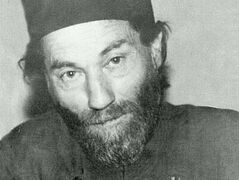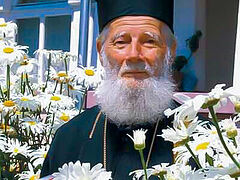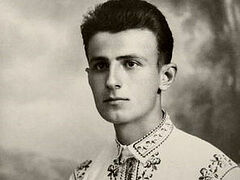On July 19, 2011, at the age of ninety-six, the Romanian elder Archimandrite Arsenie (Papacioc) reposed in his cell at Techirghiol Monastery.
“This Romanian spirit was born in sacrifice and is sacrificing itself now!
This will revive the Romanian people”
Not far from the sea, washed by the lazy waves of the Gulf of Techirghiol, there is a resort famous for its healing powers. For centuries, the soldiers of distant Rome and the Ottomans of Said Pasha have been treating their health, smearing mud on their arms mangled in battle. Nearly seventy years ago, Patriarch Justinian decided to erect a monastery on this resort, so the ministers of God could heal their bodily illnesses there. The primate of Romanian Orthodoxy then decided to transfer a humble monk there, who by his colossal spiritual strength would turn bodily healings in Techirghiol into spiritual and mental healing.
Whoever came to Fr. Arsenie could never forget the clear gaze of his blue eyes, in which the sky seemed to converge with the sea, and his tiny, light, and agile figure. Father was always full of colossal energy, which spilled out in his rapid movements, despite the Elder’s ninety-six years.
Something light and barely perceptible came from him. His speech was interspersed with a cheerful laugh, and the silence was brightened with a smile. His gray beard, long and majestic, spoke of his age of supreme wisdom in the best way possible. Nevertheless, Father paradoxically remained very young. Every time I saw him, he would tell me that “if in youth there is no cloud of old age, in old age there will be no ray of youth.”
“Arsenie the Great,” as Fr. Ioan Buga, perhaps the greatest portraitist of Romanian confessors, called him, had the type of soul that is rarely found among mortals. Welded together in the crucible of suffering from a white and pure alloy of love that doesn’t change with the years, he remained soft as a feather and sharp as steel in old age.
Father can’t be separated from the history of our land—he seems embedded in it. After fiery words about Heavenly love, after prayerful appeals and exhortations to humility, he’d always find a reason to tell you about the cross of the Romanian people, about our eternal hardships, and especially about our calling and purpose before God:
“I am so optimistic about the resurrection of the Romanian people that I can’t even speak due to this outpouring from my heart. This Romanian spirit was born in sacrifice and is sacrificing itself even now! This will revive the Romanian people.”
A great priest, who, before reprimanding, would absorb the soul of a spiritual child into himself, Fr. Arsenie would sift through his pains and passions until he could release the one kneeling before him, filled with joy for liberation from above. Therefore, hundreds of thousands of Romanians had recourse to his priestly stole, for advice and a word of edification, turning a small seaside resort from a place of physical healing into an unseen citadel of the Spirit.
The child from the shepherd’s paradise
Fr. Arsenie was born in the Bărăgan Plain, where harsh winds blow freely, the sun bakes in summer, and the bitter frost bites in winter. In olden days, it was a paradise for shepherds. They came down here from the mountains to the vast expanses, to graze their sheep where no wild animals prowled. This is what Mircea Papacioc did—his grandfather, a proud and wealthy Arman1 who had moved there from Macedonia. He led a flock of several thousand sheep with him. When he arrived together with them, a boyar from Slobozia asked him to take care of his sheep too and brought them to his flock.
“How many do you have?” Mircea Papacioc asked him haughtily.
“Mmm, somewhere around seventy,” the boyar answered.
“Why, I have seventy dogs!” our Arman proudly said, cutting him off.
The future Fr. Arsenie was born on August 15, 1914, on the feast of the Dormition of the Most Holy Theotokos. In Baptism, he received the name Angel, a heavenly name, as if foretelling the monastic life to which he would give his entire life. Indeed, he felt an attraction to Christ from the very beginning, from childhood, and everyone around him was amazed by his gentleness and love.
One day, some boys from a neighboring village brutally whipped him with some acacia branches covered in sharp thorns, which tore his legs up. At first, the little Angel wanted to tell his father about it.
“He had authority over six villages as a sanitary inspector. But I told myself: ‘No, I won’t say anything. He’ll give them a whooping and God won’t like it. It’s better if I just endure it.’”
Fr. Arsenie was distinguished his whole life by loving forgiveness. He not only preached forgiveness, but generously gave it to everyone he met. In his youth, he went through a serious ordeal: His brother was killed. When the murderer was finally caught, Angel had the chance to take revenge on him, but instead of raising a hand to strike, he forgave him. And he even said to the killer:
“You can be calm. Absolutely nothing will happen to you! I myself will put a guard at your gate so no one can lay a finger on you.”
Years later, he would tell his disciples that “revenge doesn’t solve anything. We have to love our enemies. This isn’t utopianism—after all, God has endowed us with such sacred kindness of heart precisely so that a drop of love would form between people.” But in order to cultivate such virtue in the soul, one must possess not only colossal power of self-sacrifice, but also an iron will, which would untie the knots on the strings of the heart, so that the infiniteness of God would be seen in it.
Love for Christ
The pure soul of Fr. Arsenie dreamed of a country “proud as the sun in the sky.” He always believed in the rebirth of the Romanian nation. Perhaps this national ideal is what prompted him to join the Legionnaires movement, eventually becoming the head of the local county branch and later the head of the village of Zărnești in Brașov County during Antonescu’s rule.
 Angel Papacioc at his first arrest
Angel Papacioc at his first arrest
Those were turbulent times during which many pure souls were sacrificed. Angel would also pay dearly for this stage of his life, first with two years in prison in Miercurea Ciuc, and then five more. He was released in 1946 and returned to his native village in Misleanu, Ialomița County.
Imprisonment completely changed him. In prison, he prayed much and intensely, detaching himself from the terrible realities that surrounded him, enjoying the caress of grace. A witness from those years says that when everyone would go to work, they would leave Angel Papacioc behind in the cell, because he was ill. He would crouch in the corner and sit there for hours, his soul thirsty for the love of God. Time and space melted away on the edge of eternity. His comrades would return, but he didn’t notice them, no matter how much noise they made. So they began to revere him as a man of God, although he wasn’t a cleric.
There was only one thing that could quench such a fervent thirst for God: monasticism. Father’s face would shine with a smile when he would speak about how he made this decision. In fact, Father always smiled; he had an inner joy, as if the world were full of only goodness and beauty. But when he would talk about monks and monasticism, his favorite topic, he was transfigured:
“Because God wants us for Himself, whatever the cost. People come to the monastery with great love. It’s madness for Christ, the desire to be crucified with Him, to endure anything to reach a state of love for everyone.”
On the threshold of Paradise
In the case of this grandson of a Dobrogean shepherd, his “madness for Christ” began at Cozia Monastery, where the young Angel was received and soon appointed as a teacher at the school that operated at the monastery.
Those were the years when atheism simmered in the veins of this people, preparing the red desert that was soon to come. The topic for the first lesson that Fr. Arsenie announced to the children was: “About Jesus Christ.”
The security authorities of the city of Râmnicu Vâlcea immediately became aware of this, and Father had to leave the school. A long period of wandering began: He passed through the monasteries of Cioclovina, Sihăstria, and Antim, but the road stopped at the monastery of Slatina, where he was appointed igumen by Fr. Cleopa (Ilie), who was the abbot there at that time.
Perhaps the most secretive period of his life was spent in the desert wilds around Sihăstria Monastery, at some distance from his friend and spiritual father Archimandrite Cleopa (Ilie). Humility didn’t allow him to speak about his asceticism in the desert of the Neamț mountains. His soul was immersed in silence and contemplation then. It’s hard to imagine the unceasing prayer, struggles with the demons, and Divine joy that the hesychast had. To labor there, you have to have the courage of a martyr.
This common labor united the two great confessors until death. Fr. Arsenie had a deep respect for Fr. Cleopa, whom he always considered a hero of faith, “who taught the world how to die.”
“Once, I was with Fr. Cleopa in the desert, lying on the roots of a fir tree, when suddenly a snake came slithering out of the roots and slithered up to him. I jumped up: ‘Father, a snake! It’s coming towards you!’ ‘Leave it alone,’ Fr. Cleopa answered. ‘Let it warm up too.’”
The lives of the saints abound with similar descriptions. St. Isaac the Syrian says a hesychast can achieve such closeness to the Lord that his heart is filled with pity for the whole of creation. His heart loves not only people, but also animals, and all of nature. This was perhaps the biggest lesson that the eremitic life taught Father. “All of Scripture is mercy,” he would repeat in his old age. He would use this lesson again in the coming years, as Christ again prepared a Golgotha of communist prisons for him.







